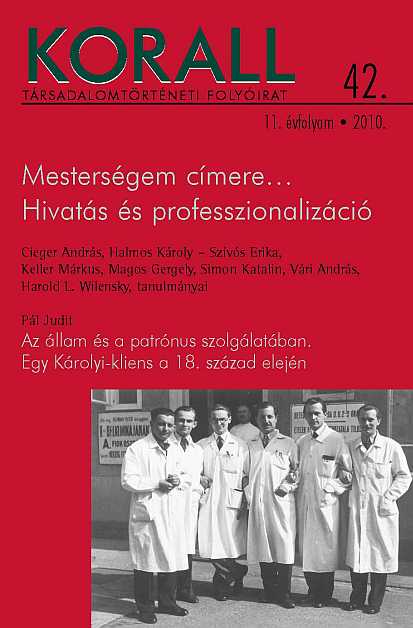A kelet-közép-európai változat. A középiskolai tanárság professzionalizációja a 19. században
The East Central European Version. The Professionalization of Secondary Education in Nineteenth-Century Hungary
Author(s): Márkus KellerSubject(s): History
Published by: KORALL Társadalomtörténeti Egyesület
Summary/Abstract: The study analyses the professionalization of Hungarian secondary teachers with a methodology based on Hannes Siegrist’s professionalization terminology of ideal types. In contrast to the classic (Anglophone) theories of professionalization, this approach attributes an important role to the state in the Hungarian professionalization process. Furthermore, it does not view this process as unidirectional: previously attained positions and prerogatives could be forfeited any time. Consequently, the main question is not whether teaching at secondary school was considered a vocation. Instead, Keller asks if any signs of professionalization can be detected in the history of Hungarian secondary education and what these signs were. The study concentrates on four themes. First, how did teacher training evolve, how was it regulated, and, as a result, how did the specialised knowledge required for secondary education develop as a result? Second, how did the teachers build their professional ethics and maintain their importance within society? Third, in what ways did the teachers strive to defend their professional autonomy and create a monopoly? Finally, how did professionalization affect the economic and social position of secondary teachers? The analysis of the history of secondary education from these angles demonstrates that the process of professionalization is clearly perceptible in the case of Hungary. There has evolved a centrally regulated training and qualification system that was essentially compulsory for all candidates wishing to pursue this career, and this training also includes pedagogy, the specialised discipline of teaching. A study of the journal published by the National Association of Secondary Education (later, of Secondary School Teachers) reveals that professional ethics and the image of the ‘ideal teacher’ was fully formed by the last decades of the nineteenth century. The main purpose of these was the justification of the importance of the work of teachers in society. The existence of professional autonomy, as well as the measures taken to protect it, proves that secondary education was on the way to full professionalization in this period. At the same time, the continuous amelioration of the social and economic position of secondary school teachers suggests that the consequences of the aforementioned professionalization processes are also reflected in their rising social prestige. As compared with the contemporaneous German situation, the professionalization of Hungarian secondary teachers is markedly associated with a characteristic importance of churches and church endowments. On one hand the presence of religion in the process hindered professionalization, as it decelerated the separation of teaching from clerical and ministerial roles and impeded the development of comprehensive teacher training and qualification. On the other hand, the presence of churches that were independent of the state and had vested interest in the educa
Journal: Korall - Társadalomtörténeti folyóirat
- Issue Year: 2010
- Issue No: 42
- Page Range: 103-130
- Page Count: 28
- Language: Hungarian

